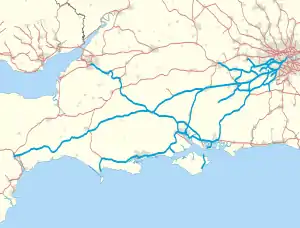South Western Railway (train operating company)
First MTR South Western Trains Limited,[1] trading as South Western Railway (SWR), is a British train operating company owned by FirstGroup (70%) and MTR Corporation (30%) that operates the South Western franchise. It operates commuter services from its Central London terminus at London Waterloo to South West London. SWR provides suburban services in the counties of Surrey, Hampshire and Dorset, as well as regional services in Devon, Somerset, Berkshire and Wiltshire. Its subsidiary Island Line operates services on the Isle of Wight.
 | |||
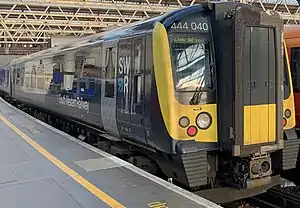 Class 444 Desiro at London Waterloo in 2019 | |||
| Overview | |||
|---|---|---|---|
| Franchise(s) | South Western (20 August 2017 – 31 March 2023 (with possible two year extension to 31 March 2025) | ||
| Main region(s) | |||
| Other region(s) | |||
| Fleet size | |||
| Parent company |
| ||
| Reporting mark | SW | ||
| Other | |||
| Website | www | ||
| |||
SWR was awarded the South Western franchise in March 2017,[2] and took over from South West Trains on 20 August 2017.
History
in July 2015, having failed to negotiate an extension with South West Trains (the operator at the time, owned by Stagecoach), the Department for Transport (DfT) announced that the South Western franchise would be relet.[3][4][5]
In February 2016, the DfT announced FirstGroup and Stagecoach had been shortlisted to bid for the next South Western franchise.[6][7] In June 2016, MTR Corporation took a 30% shareholding in the FirstGroup bid.[8][9] In July 2016, the DfT issued the Invitation to Tender.[10][11]
In March 2017, the franchise was awarded to First/MTR, operating from 20 August 2017 to 18 August 2024, with an option for the DfT to extend for a further 48 weeks.[12][13][14]
In July 2017, the Competition & Markets Authority (CMA) sought undertakings from SWR that it would not abuse its monopoly on services to the West of England, Dorset and Somerset, as FirstGroup also operated the Greater Western franchise in those regions.[15][16] The CMA accepted a concession from FirstGroup and MTR that unregulated fares between London and Exeter would be capped.[17]
In April 2018, concerns began to grow over South Western Railway's performance over previous months after the number of delays and cancellations began to rise. The Transport Secretary, Chris Grayling, announced an independent review into the performance of South Western Railway and Network Rail. This was welcomed by Winchester's MP, Steve Brine.[18]
In July 2018, it was reported that FirstGroup/MTR were renegotiating the SWR contract due to the operator's inability to deliver on many of its promised improvements, as well as its declining performance and history of industrial action.[19]
From 2 December 2019 until 2 January 2020 (excluding 12, 25 and 26 December 2019), the RMT union undertook a 27-day rail strike (the longest in UK railway history) in protest to SWR's plans to potentially introduce DOO (driver only operation) on their new Bombardier suburban fleet (Class 701), which would thereby nullify the role of the guard.[20]
In January 2020, SWR announced that they were in discussions with the government regarding the future of the franchise following a £137 million loss, with termination of the contract being a possibility.[21]
In December 2020, it was announced that the franchise system for SWR would be abolished, and the company would be given a management contract to run until 1 April 2023 when the EMRA (Emergency Recovery Measures Agreement) for the franchise ends in March 2021.[22]
Services
South Western Railway is the main operator for western Surrey, Hampshire and Dorset, and also serves London, Berkshire, Wiltshire, Somerset and Devon.
Most SWR services run on electrified lines using the 750 V DC third-rail system. There is a diesel fleet for services on the West of England line to Salisbury, Exeter and Bristol, using the unelectrified track beyond Worting Junction just west of Basingstoke, and for Salisbury to Southampton via Romsey services which also serve Eastleigh. SWR operates almost 1,700 train services per day.
From London Waterloo, SWR's London terminus, long-distance trains run to southern England, including the major coastal population centres of Portsmouth, Southampton, Bournemouth, Poole and Weymouth. There are also trains to Reading, Exeter and Bristol, but these are not the principal fast services from London to those cities, which are operated from London Paddington by Great Western Railway. The majority of its passengers are on suburban commuter lines in inner and south-west London, Surrey, east Berkshire, and north-east Hampshire.
As with most rail companies, non-folding bicycles are banned from peak-time trains to and from London. However, these restrictions apply only to cyclists boarding or alighting in the area bounded by Hook, Alton, Guildford, Reading and Dorking, in order to maximise available passenger space on the most crowded trains.[23]
Mainline services
South Western Railway operates regular services on four mainline routes:[24][25]
- The South Western Main Line (SWML) runs between London (Waterloo station) and the town of Weymouth; the route passes through several large towns and cities, including Woking, Basingstoke, Winchester, Southampton, Bournemouth, Poole and Dorchester. South Western Railway operates trains along the entire length of the line. Almost all trains operated by the company start from or terminate at London Waterloo; these include stopping services as far as Basingstoke, semi-fast services to/from Southampton and Poole, and express services to/from Weymouth. There are also trains to and from Portsmouth; these trains branch off the SWML at Eastleigh, then proceed via the Eastleigh to Fareham and West Coastway lines to Portsmouth Harbour station. In addition to the South Western Railway services, CrossCountry operates regular passenger services on the line between Basingstoke, Southampton and Bournemouth;[26] these usually run to and from Manchester or Newcastle.[27]
- The Portsmouth Direct Line (PDL) branches off the SWML at Woking and runs to Portsmouth via Guildford, Haslemere, Petersfield and Havant. South Western Railway operates all passenger trains on this route; these include fast and semi-fast services between London and Portsmouth, and semi-fast services as far as Haslemere.
- The West of England Main Line (WEML) is the only mainline route that is not fully electrified.[28] It leaves the SWML at Basingstoke and runs to Exeter via Andover, Salisbury, Gillingham and Yeovil. South Western Railway is the only operator on the line, with most services running between London and either Salisbury or Exeter St Davids. Some peak-time services terminate at various other destinations on the line, including Gillingham and Andover; other peak services branch off the line and run to Bristol Temple Meads station via the Wessex Main Line. On Summer Saturdays, there is also a daily return service to Weymouth, which leaves the WEML at Yeovil Junction and continues via the Heart of Wessex Line.
- The Alton Line leaves the SWML at Brookwood (just after Woking) and runs to Alton via Aldershot and Farnham. It is the shortest of the four mainline routes and as such it is sometimes considered an outer suburban route instead (however for ticketing purposes, it is classed as a mainline route). Services usually run the full length of the line between London and Alton, though some services terminate at Farnham.
In total, there are 14 mainline trains per hour departing London Waterloo in the off-peak; this number increases in the peak hours.[25] The majority of mainline services are operated by Class 444 or Class 450 EMUs, except for the West of England Main Line which is always operated by Class 158 or Class 159 DMUs (because it is unelectrified) and the Alton Line which also sees the occasional use of Class 458 units.
Metro and Suburban services
South Western Railway also operates many suburban "Metro" services in and around London. These all run between London Waterloo and Clapham Junction, where they split into two separate routes: via Putney and via Wimbledon.[24] All services on the suburban part of the network are operated by Class 450, Class 455, Class 456, Class 458 and Class 707 electric multiple units.
Via Putney
The main route via Putney is known as the Waterloo to Reading Line. It runs between London and Reading and passes through towns such as Staines-upon-Thames, Ascot and Bracknell. Branch lines on this route include:[24][25]
- The Hounslow Loop Line, which leaves the main line at Barnes, runs via Brentford and rejoins the line between Whitton and Feltham (with junctions in both directions). Most services on the branch run either between London and Weybridge (described below), or run in a loop from Waterloo to Waterloo via Brentford, Whitton and Richmond (these services run both clockwise and anticlockwise).
- The Kingston Loop Line, which branches off at Twickenham, runs via Kingston and joins the South Western Main Line at New Malden. Most services on this line run in an anticlockwise loop, from Waterloo to Waterloo, via Putney, Strawberry Hill, Kingston and Wimbledon.
- There is also a branch line to Shepperton, however, this is only served by Putney trains at peak times.
- The Staines to Windsor Line, which branches off the main line at Staines-upon-Thames and runs to Windsor & Eton Riverside station. Most services run semi-fast between London and Windsor.
- The Chertsey Branch Line, which leaves the main line at Virginia Water and runs to Weybridge. Most services on the line run between London and Weybridge via the Hounslow Loop Line; a few services are extended beyond Weybridge, to and from Woking.
- The Ascot to Guildford Line, which is only served by through trains at peak times; these services run between London and Aldershot.
A total of 12 trains per hour run between London Waterloo and Putney in the off-peak; this number increases in peak hours.[25]
Via Wimbledon
The main route via Wimbledon uses the slow tracks of the quadruple-track South Western Main Line. Suburban trains run along the mainline between London and Woking. Branch lines on this route include:[24][25]
- The Mole Valley Line, which branches off the main line at Raynes Park and runs via Epsom to Leatherhead, where the branch line itself splits into two lines: one to Guildford and one to Horsham via Dorking. SWR runs regular services to both Guildford and Dorking; the section between Dorking and Horsham is operated by Southern.[29]
- The Chessington Branch Line branches off the Mole Valley Line at Motspur Park and runs to Chessington.
- The Kingston Loop Line, which leaves the SWML at New Malden, runs via Kingston and joins the Waterloo to Reading line at Twickenham. Most services on this line run in a clockwise loop, from Waterloo to Waterloo, via Wimbledon, Kingston, Strawberry Hill and Putney.
- The Shepperton Branch Line, which branches off the Kingston Loop Line at Teddington. Most services on the branch line run between Waterloo and Shepperton via Wimbledon.
- The Hampton Court Branch Line, which leaves the main line at Surbiton and runs directly to Hampton Court.
- The New Guildford Line, which also branches off at Surbiton, running to Guildford via Claygate. The line joins the Guildford branch of the Mole Valley Line at Effingham Junction.
A total of 16 trains per hour run between London Waterloo and Wimbledon in the off-peak; this number increases in peak hours.[25]
Other services
Routes that do not start or terminate at London Waterloo include:[24][25]
- The Ascot to Guildford Line, which runs between Ascot and Guildford via Aldershot. Most services on the line run only between Ascot and Guildford, with no extension in either direction; however, some peak-time services do run between London and Farnham via Ascot. The shuttle services are usually operated by Class 450 units.
- The western section of the West Coastway Line between Portsmouth and Southampton. Class 450 units are usually in operation on this route.
- The Eastleigh to Romsey Line between Romsey and Eastleigh. Services on the line are extended beyond Eastleigh to and from Salisbury via Southampton Central and Romsey, in effect calling at Romsey twice. These services are operated using Class 158 units.
- The Wessex Main Line between Salisbury and Southampton. Services are extended beyond Southampton via the Eastleigh to Romsey Line, as described above.
- The Lymington Branch Line between Brockenhurst and Lymington Pier runs every 30 minutes between these two stations. This is done entirely by Class 450 units on this line
- The Island Line on the Isle of Wight, between Ryde Pier Head station and Shanklin. These services are operated using former London Underground Class 483 units: the oldest non-heritage trains in Britain.
Service table
Details of each route, including maps and timetables, are on the South Western Railway official website (see External links below). As of December 2020, its routes off-peak Monday to Friday, with frequencies in trains per hour (tph), include:[30]
| London Mainline routes (South Western Main Line) | |||
|---|---|---|---|
| Route | tph | Calling at | Unit |
| London Waterloo to Basingstoke | 2 | 450 | |
| London Waterloo to Portsmouth Harbour via Winchester | 1 |
|
|
| Southampton Central to Bournemouth | 1 | 444 | |
| London Waterloo to Weymouth | 1 |
| |
| London Mainline routes (Portsmouth Direct Line) | |||
| Route | tph | Calling at | Unit |
| London Waterloo to Haslemere | 1 | 450 | |
| London Waterloo to Portsmouth Harbour via Guildford | 1 |
|
|
| 1 |
| ||
| London Mainline routes (West of England Main Line) | |||
| Route | tph | Calling at | Unit |
| London Waterloo to Exeter St Davids | 1 |
Feniton and Whimple are served by alternate trains. |
|
| Basingstoke to Salisbury | 1 |
Extended to Reading on Sundays. | |
| London Mainline routes (Alton Line) | |||
| Route | tph | Calling at | Unit |
| London Waterloo to Alton | 2 | 450 | |
| London Metro and Suburban routes (Windsor lines) | |||
| Route | tph | Calling at | Unit |
| London Waterloo to Weybridge | 2 | ||
| London Waterloo to London Waterloo via Whitton | 2 |
| |
| 2 |
| ||
| London Waterloo to London Waterloo via Kingston (anticlockwise) | 2 |
Services continue to London Waterloo via New Malden (see below). | |
| London Waterloo to Windsor & Eton Riverside | 2 |
| |
| London Waterloo to Reading | 2 |
|
|
| London Metro and Suburban routes (via Wimbledon) | |||
| Route | tph | Calling at | Unit |
| London Waterloo to Chessington South | 2 | ||
| London Waterloo to Dorking | 1 |
| |
| London Waterloo to Guildford via Epsom | 2 |
| |
| London Waterloo to Shepperton | 2 |
| |
| London Waterloo to London Waterloo via Kingston (clockwise) | 2 |
Services continue to London Waterloo via Richmond (see above). |
|
| London Waterloo to Hampton Court | 2 |
|
|
| London Waterloo to Guildford via Claygate | 2 |
| |
| London Waterloo to Woking | 2 |
| |
| Non-London routes | |||
| Route | tph | Calling at | Unit |
| Ascot to Aldershot | 2 | 450 | |
| Guildford to Farnham | 2 |
| |
| Fratton to Southampton Central | 1 | ||
| Romsey to Salisbury | 1 |
|
|
| Brockenhurst to Lymington Pier | 2 | Lymington Town | 450 |
| Salisbury to Bristol Temple Meads | 2tpd |
|
|
| Island Line | |||
| Route | tph | Calling at | Unit |
| Ryde Pier Head to Shanklin | 1 | Ryde Esplanade, Ryde St John's Road, Smallbrook Junction (limited service), Brading, Sandown, Lake | No current service. Future units are 484s |
Future services
Improvements promised under the 2017 contract were:[31]
- Refurbished trains
- Journeys to London 8 minutes faster from Southampton, 9 minutes faster from Bournemouth, 10 minutes faster from Exeter and 14 minutes faster from Weymouth
- Free Wi-Fi at all stations and on mainland trains
- 29 additional weekday and Saturday services between Portsmouth & Southsea and Southampton Central
- Hourly direct trains from Weymouth to Portsmouth to begin before 2019
- 35 additional weekday and Saturday services between Portsmouth & Southsea and London Waterloo
- More Sunday services
- Investment in stations, including improvements to Southampton Central station
- Live information on seating availability and crowding levels via a new mobile phone app
As of 19 May 2019, there is also an hourly Sunday service between Reading and Salisbury via Basingstoke (with trains running between 0800 and 1800).[32]
Rolling stock
South Western Railway inherited a fleet of Class 158, Class 159, Class 444, Class 450, Class 455, Class 456, Class 458, Class 483 and Class 707s from South West Trains, and subsequently re-introduced Class 442 trains which had operated on Gatwick Express after earlier service with South West Trains.
Current fleet
| Trainset | Class | Image | Type | Top speed | Carriages | No. | Routes | Built | |
|---|---|---|---|---|---|---|---|---|---|
| mph | km/h | ||||||||
| Mainland | |||||||||
| Sprinter | 158 Express Sprinter |  |
DMU | 90 | 145 | 2 | 10 |
|
1989–92 |
| 159 South Western Turbo |  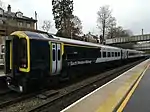 |
3 | 30 | West of England, Heart of Wessex and Wessex Main Lines:
|
| ||||
| BR Second Generation (Mark 3) | 442 Wessex Electrics |  |
EMU | 100 | 160 | 5 | 18 | 1987-89 | |
| Siemens Desiro | 444 | 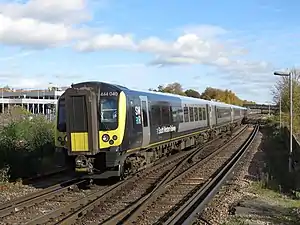 |
5 | 45 |
|
2003–04 | |||
| 450 | 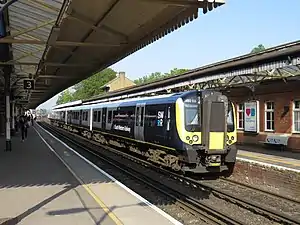 |
4 | 127 | Outer suburban routes:
|
2002–06 | ||||
| BR Second Generation (Mark 3) | 455 |   |
75 | 120 | 4 | 91 | Inner suburban routes: | 1982-85 | |
| 456 | 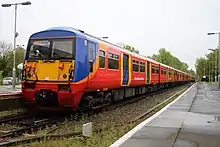 |
2 | 24 | Inner suburban services in conjunction with services operated by Class 455 units to make 10 coach trains. | 1990–91 | ||||
| Alstom Coradia Juniper | 458 | 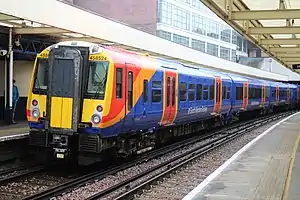 |
5 | 36 | Outer suburban services:
|
| |||
| Siemens Desiro | 707 Desiro City | _up_train.JPG.webp) |
100 | 160 | 5 | 30 | Outer suburban services:
|
2015-18 | |
Future fleet
Classes 455, 456, 458 and 707 fleets will be replaced by 30 five and 60 ten carriage Class 701 units built at Bombardier's Derby Litchurch Lane Works, for use on London to Reading, Windsor and suburban services from March 2021.[33][34][35] Five two car Class 484s are to replace the Class 483 on the Island Line in early 2021. These will continue to be powered by electricity drawn from the third rail.[36]
| Trainset | Class | Image | Type | Top speed | Carriages | Number | Routes operated | Enter Service | |
|---|---|---|---|---|---|---|---|---|---|
| mph | km/h | ||||||||
| Vivarail D-Train | 484 | EMU | 60 | 100 | 2 | 5 | Island Line | 1 April 2021 | |
| Bombardier Aventra | 701/0 | 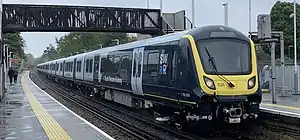 |
100 | 160 | 5 | 30 | Reading, Windsor and South West London suburban services | March 2021 | |
| 701/5 | 10 | 60 | |||||||
Past fleet
Six Class 483s were withdrawn from service on 3rd January 2021. The last 483 train to be withdrawn was 483006.
| Trainset | Class | Image | Type | Top speed | Carriages | Number | Routes operated | Built | Withdrawn | |
|---|---|---|---|---|---|---|---|---|---|---|
| mph | km/h | |||||||||
| 1938 tube stock | 483 |  |
EMU | 45 | 72.5 | 2 | 6 | Island Line | 1938 | 2020-2021 |
Depots
A large number of train depots and stabling sidings located across London and South West England service and maintain the South Western Railway fleet.
Bournemouth
Bournemouth depot is southwest of Bournemouth station, occupying the approach to the former Bournemouth West station. Until their withdrawal in February 2007, the depot was home to the Class 442 (5Wes) Wessex Electrics, and has become so again following their reintroduction. The branch turns off at Branksome station where trains can be seen stopping at platform 2 and reversing into the depot.
Farnham
Farnham Traincare Depot, in Weydon Lane, was opened by the Southern Railway at the time of the electrification of the Portsmouth and Alton lines in 1937.[37] It was refurbished for the introduction of modern units when slam-door trains were replaced circa 2005. At the same time, disused quarry and ballast dump sidings behind the carriage shed were removed and a number of outdoor sidings were laid for overnight storage and servicing of units.
Feltham
Feltham depot, currently under construction, will open in 2021 and will be providing stabling for the Class 701 units.
Fratton
Fratton Traincare Depot is located on central Portsea Island, alongside Fratton station. It has a carriage washer and is the fuelling point for the 158s and 159s. The depot has a train shed with two pitted roads for maintenance of rolling stock. Class 444 and 450 units berth overnight. Stabling sidings and bay platforms at Portsmouth & Southsea station are co-ordinated from the depot.
Northam
Northam depot was built by Siemens in 2002 as the home depot for the Desiro fleet as part of a 20-year maintenance contract.[38] It is located south of St Denys station and is near Southampton Football Club's St Mary's Stadium.
Ryde
Ryde depot, alongside Ryde St John's Road on the Isle of Wight serviced the Class 483 units that used to operate on the Island Line.
This has been refitted to allow the new Class 484 to be serviced.
Salisbury
Salisbury depot provides servicing for the South Western Railway diesel fleet.
Strawberry Hill
Strawberry Hill train maintenance depot in South West London, was built in 1897, is inside the triangular junction of the Shepperton Branch Line with the Kingston Loop Line, just yards from Strawberry Hill railway station.
Wimbledon
Wimbledon Traincare depot is located between Wimbledon and Earlsfield stations, on the main line to Waterloo, next to the Wimbledon railway viaduct. It is currently the home of the Class 455, 456, 458/5 and 707 fleets, although other classes from the SWR fleet berth overnight there.
References
- "FIRST MTR SOUTH WESTERN TRAINS LIMITED". Companies House. HM Government. Retrieved 15 January 2021.
- Co, Josie (27 March 2017). "Government awards First MTR franchise to run South Western rail service". The Independent. Retrieved 15 January 2021.
- "South West Trains franchise 'out to competition'". BBC News. 7 July 2015. Retrieved 15 January 2021.
- "South West Trains to be refranchised". Railway Gazette International. DVV Media Group. 7 July 2015. Retrieved 15 January 2021.
- "No direct franchise for South West Trains in 2017" Rail Magazine issue 779 22 July 2015 page 8
- Two companies shortlisted to compete for the next South Western rail franchise Department for Transport 4 February 2016
- Stagecoach and FirstGroup shortlisted for South Western franchise Railway Gazette International 4 February 2016
- MTR and First partner for South Western bid Rail Magazine 16 June 2016
- MTR joins FirstGroup's bid for South Western rail franchise Railway Gazette International 16 June 2016
- Better journeys on the way for rail passengers across the South Western network Department for Transport 4 July 2016
- South Western invitation to tender issued Railway Gazette International 4 July 2016
- South West Trains: Hong Kong firm MTR to help run rail franchise BBC News 27 March 2017
- South Western Railway FirstGroup
- First MTR joint venture wins South Western franchise Railway Gazette International 27 March 2017
- FirstGroup and MTR / SouthWestern rail franchise merger inquiry Competition & Markets Authority
- Anticipated acquisition by First MTR South Western Trains Limited of South Western Franchise Competition & Markets Authority
- Gerrard, Bradley (18 August 2017). "Rail fares set to be capped between London and Exeter". The Telegraph. Retrieved 29 August 2017.
- "South Western Railway to face government review over performance, transport secretary announces". Basingstoke Gazette. 25 April 2018.
- "SWR's future could be in doubt as negotiations are tabled". Rail Technology Magazine. 24 July 2018. Retrieved 24 July 2018.
- "South Western Railway guards vote for more strikes". BBC News. 23 January 2020. Retrieved 15 January 2021.
- "Rail firm could lose franchise after £137m loss". BBC News. 7 January 2020. Retrieved 7 January 2020.
- "Two franchises abolished for good, as First and DfT agree terms". Railnews. 10 December 2020. Retrieved 10 December 2020.
- "Travelling with a bike". South Western Railway. Retrieved 22 August 2017.
- Our network | South Western Railway
- Train timetables | South Western Railway
- XC Route Map
- Train Timetables | Cross Country
- Wessex Route Plan (p.25)
- Network Map : Southern
- "Train Timetable". South Western Railway. Retrieved 17 December 2020.
- Our proposition FirstGroup
- "Check Train Times and Timetables | Great Western Railway". www.gwr.com. Retrieved 11 May 2019.
- South Western orders new fleet of 90 trains BBC News 20 June 2017
- FirstGroup and MTR order 750 EMU cars for South Western franchise International Railway Journal 20 June 2017
- Bombardier to supply 750 EMU cars for South Western franchise Railway Gazette International 20 June 2017
- Isle of Wight line's future secured with £26m investment Railway Gazette International 16 September 2019
- Railway Gazette, 1937
- "Desiro UK demands a pit stop approach". Railway Gazette. 1 March 2002.
External links
| Wikimedia Commons has media related to South Western Railway. |
| Preceded by South West Trains |
Operator of South Western franchise 2017–2023 |
Succeeded by Incumbent |
